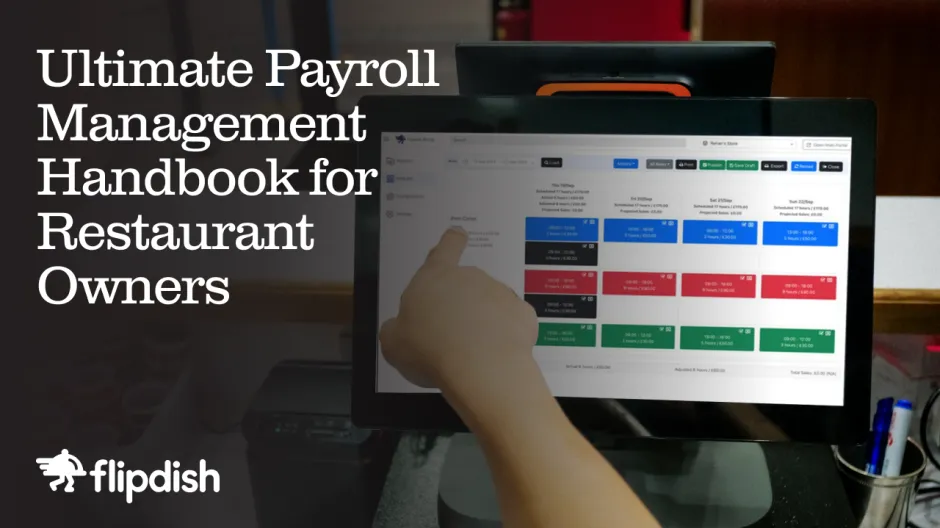Ultimate Payroll Management Handbook for Restaurant Owners
Managing payroll in the restaurant industry demands accuracy, adaptability, and compliance. A robust restaurant payroll system should seamlessly handle fluctuating shift schedules, variable tip distributions, and complex labor laws, while ensuring timely, error-free payments. The best systems automate calculations, simplify tax filings, and integrate with time-tracking tools to minimize administrative overhead. Choosing the right payroll solution not only reduces costly errors and penalties but also boosts employee satisfaction, operational efficiency, and long-term retention.

Summary
Managing payroll in the restaurant industry is complex and time-sensitive. From handling shift patterns and tips to complying with legal regulations and ensuring timely payments, restaurant payroll management requires precision. This guide will help you understand what a restaurant payroll system should include, how to choose the best one, and how to avoid costly payroll mistakes while maximising team satisfaction and efficiency.
Table of Contents
What is a Restaurant Payroll System?
A restaurant payroll system is a specialised solution designed to handle the unique requirements of paying employees in hospitality businesses. Unlike traditional payroll software, these systems account for hourly rates, variable shifts, split payments (such as tips), overtime, and regulatory compliance.
A well-configured restaurant payroll system integrates with your scheduling, POS, and HR tools, automating calculations and reducing administrative burden. For restaurants, cafes, QSRs, and food trucks where staff turnover and varied hours are common, this automation is not just helpful, it’s essential.
Key Features and Compliance
Navigating payroll in the restaurant and hospitality industry isn’t just about paying staff on time, it’s about getting it right under pressure, within complex working environments, and in full alignment with ever-evolving legal standards. Whether you're running a small café or a multi-site restaurant chain, your payroll system must go beyond the basics. Here’s what to look for when evaluating its key features and compliance capabilities:
Automated Time Tracking
Efficient payroll begins with precise timekeeping. A payroll system that integrates real-time clock-ins and clock-outs with your shift scheduling software eliminates discrepancies and reduces human error. Features like geolocation punch-ins, mobile check-ins, and biometric authentication can further enhance reliability, especially helpful in busy kitchen or bar environments where staff may clock in on the go.
In my experience, relying on manual timesheets or outdated punch cards is a recipe for payroll disputes and unnecessary admin. Once we moved to an integrated time-tracking tool, the reduction in payroll queries was immediate and noticeable.
Shift-Based Pay and Overtime Handling
Restaurant staff rarely work standard 9-to-5 shifts. Payroll software must account for the full range of working patterns and associated compensation rules. Essential capabilities include:
-
Split shift tracking: Calculating rest breaks and overtime appropriately when staff return for double shifts.
-
Overtime management: Automatically applying tiered overtime rates after specific thresholds (e.g., 40+ hours per week or 8+ hours per shift).
-
Bank holiday and weekend premiums: Accurately calculating enhanced pay for holidays and Sundays, especially in unionised or contracted environments.
-
Night work premiums: Applying additional pay for staff working past designated night hours, often from 11 PM to 6 AM.
Personally, I believe this is where many payroll systems fail the hospitality sector. Generic tools built for office environments often overlook the nuances of staggered rotas, split shifts, and variable hours that are the norm in restaurants.
Tip Management
Tips and gratuities form a significant part of total compensation in hospitality and must be managed with transparency and legal accuracy. Your payroll software should:
-
Clearly differentiate between cash and card tips
-
Comply with tronc schemes where relevant
-
Enable equitable and traceable tip distribution
-
Report tips in line with national tax rules
In the UK, this means ensuring tip-outs are handled through a compliant tronc system and reported appropriately under PAYE if distributed via payroll. In Ireland, tips distributed electronically are now subject to PAYE, PRSI, and USC. A payroll system that automates this process can help avoid financial penalties and retain staff trust.
GDPR and Data Security
Payroll systems store highly sensitive personal information, including salary details, bank account numbers, and tax identifiers. Compliance with GDPR (or relevant local data protection laws) is not optional, it’s essential.
Your chosen solution should offer:
-
Role-based access controls, ensuring only authorised personnel can view or modify payroll data
-
Encrypted storage of both data in transit and at rest
-
Secure login protocols, such as two-factor authentication (2FA) and SSO (Single Sign-On) capabilities
-
Data retention controls that align with employment and GDPR retention policies
Ignoring security can lead to both regulatory fines and a major loss of employee trust. It’s not just about ticking a compliance box, it’s about protecting the people who make your business run.
Legal and Tax Compliance
Compliance with employment and taxation laws is fundamental to avoiding legal risks and maintaining operational continuity. A modern payroll system should automatically update itself in line with regulatory changes and provide in-built tools for:
-
UK Compliance:
-
Real Time Information (RTI) submissions to HMRC
-
Calculation of National Insurance Contributions (NIC)
-
Handling of auto-enrolment pension schemes
-
Support for National Minimum Wage and Living Wage tracking
-
-
Ireland Compliance:
-
Seamless support for PAYE Modernisation, including automated Revenue reporting
-
Accurate deductions for USC, PRSI, and income tax
-
Pensions integration and statutory leave calculations
-
Your system should generate all necessary reports, handle filings without manual input, and alert you to changes in pay rates or entitlements. Especially in industries like hospitality with high staff turnover and multiple pay rates, having real-time compliance baked in is non-negotiable.
Best Practices for Payroll Management

Use a Centralised Digital System
Avoid spreadsheets and manual entry. A cloud-based payroll platform allows multi-location visibility, reduces errors, and speeds up processing times.
Integrate Scheduling and POS
Payroll is most effective when tied to your employee scheduling and point-of-sale system. This allows real-time syncing of work hours and sales-based performance incentives.
Learn more about Flipdish integrations here
Transparent Communication
Employees appreciate clarity. Provide digital pay-slips, clear breakdowns of hours, deductions, and any bonus or tip distributions.
Regular Audits
Set time each quarter to audit payroll records, ensuring compliance and identifying any discrepancies. Regular reviews help you stay ahead of regulatory updates and prevent costly penalties.
Choosing the Right Payroll Tools
Scalability
Choose a solution that fits your size now, but can also scale with growth. Whether you operate a single cafe or a multi-unit QSR brand, flexibility is key.
Ease of Use
An intuitive interface helps your team onboard faster and reduces dependency on external payroll consultants.
Customer Support & Reporting
Ensure your provider offers live support, documentation, and downloadable reports for tax season, forecasting, and staff performance.
Integration with HR and Ordering Systems
Payroll isn’t an isolated function. Integrating it with employee onboarding, team management, and your digital ordering system like Flipdish creates a seamless operations flow.
Final Thoughts
Implementing the right restaurant payroll system saves time, boosts accuracy, and improves trust within your team. Whether you're managing a bustling QSR or a growing independent cafe, an optimized payroll solution contributes directly to smoother daily operations and long-term profitability.
FAQs
Restaurant payroll systems are tailored to handle hourly shifts, tips, split shifts, and high turnover rates.
Yes, but it must be recorded and declared in accordance with tax and employment laws.
Yes, most advanced systems allow multi-site payroll management and consolidated reporting.
Use systems with secure logins, encrypted data, and role-based access to keep employee data protected.
Flipdish integrates with staff management and POS systems, streamlining operations to support accurate payroll handling.


